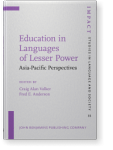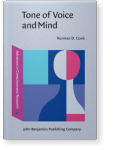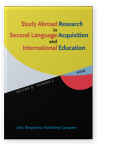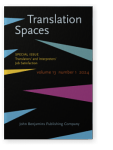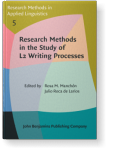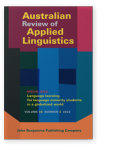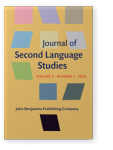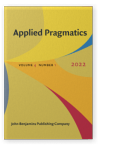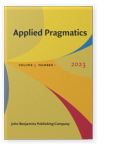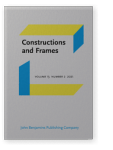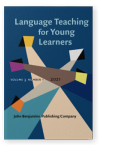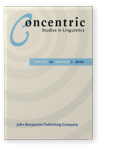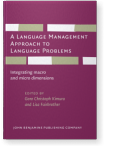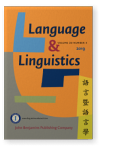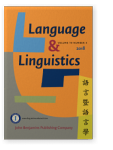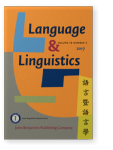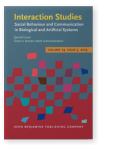Kansai University
List of John Benjamins publications for which someone affiliated with Kansai University plays a role.
Titles
Tone of Voice and Mind: The connections between intonation, emotion, cognition and consciousness
Norman D. Cook
[Advances in Consciousness Research, 47] 2002. x, 293 pp. | monographSubjects Cognitive linguistics | PhoneticsCognitive psychologyConsciousness research
2024 Introducing regression discontinuity design to applied linguistics: The case of Japanese government study-abroad scholarships
Study Abroad Research in Second Language Acquisition and International Education 9:2 pp. 217–244 | article
Keywords Regression discontinuity design | study-abroad scholarships | between-group design | within-group design | high school students
2024 Measuring translators’ quality of working life and their career motivation: Conceptual and methodological aspects
Keywords translators | language industry | work-related quality of life (WRQoL) | work satisfaction | work motivation | translation technology | survey study | psychological scale development
2023 The role of spoken vocabulary knowledge in language minority students’ incidental vocabulary learning from captioned television
Keywords breadth of vocabulary knowledge | depth of vocabulary knowledge | incidental vocabulary learning | captioned television | captioned videos
2022 Pitfalls of production data analysis for investigating L2 cognitive mechanism: An ontological realism perspective
Keywords complexity | accuracy | fluency | ontological realism | performance analysis
2022 The roles of language proficiency and study abroad in Japanese students’ receptive pragmatic competence
Keywords Japanese university students | pragmatic competence | irony | metapragmatic knowledge | study abroad
2022 Validating a test of L2 routine formulae to detect pragmatics learning in stay abroad
Keywords stay abroad | study abroad | L2 pragmatics | routine formulae | conventional expressions | argument-based validation
2021 Another look at the interaction between verbs and constructions: The case of resultatives based on wipe
Keywords resultative | non-selected object | force-recipient | frame semantics | argument structure construction | interaction between verbs and constructions | schema | enabling function
2021 Computer-mediated instruction using ondoku practice for developing elementary school students’ pronunciation
skills
Keywords computer-mediated language teaching | pronunciation instruction | young learners | corrective feedback
2020 Processes of language codification: The case of the standardization of German pronunciation
In: A language management approach to language problem: Integrating macro and micro dimensions[Studies in World Language Problems, 7] pp. 159–176
Keywords German pronunciation | codification | standardization | attitudes | standard variety | pluricentricity | orthoepy
2020 Social groups in machine translation post-editing: A SCOT analysis
Keywords SCOT (Social Construction of Technology) | machine translation (MT) | machine translation post-editing (MTPE) | translation project managers | translation industry | sociology of translation
2019 彝語諾蘇話雙及物及其他三個論元結構 [Ditransitive constructions and the other three-argument constructions in Nuosu Yi]
Keywords 彝語諾蘇話 | 三個論元結構 | 雙及物結構 | 處置義 | 語序 | Nuosu Yi language | three-argument construction | ditransitive construction | disposal construction | word order
2019 「數+量+之/的+名」的歷時語義演變 [On the semantic function of [numeral+classifier+zhi/de+noun]]
Keywords 「數+量+之/的+名」 | 數詞 | 量詞 | 歷時語義演變 | [numeral+classifier+zhi/de+noun] | numerals | classifiers | semantic evolution
2018 漢語動詞雙音化過程中的形式選擇和功能表現 (Patterns and functions of verbal disyllabification) [Patterns and functions of verbal disyllabification]
Keywords 雙音化 | 詞彙化 | 動詞 | 詞彙史 | disyllabification | lexicalization | verb | lexical change
2018 邢臺話「了1」的兩個變體 (The verbal-LE variants in Xingtai dialect) [The verbal-LE variants in Xingtai dialect]
Keywords 了1
| 條件變體 | 語法因素 | 北方方言 | 語法異質 | verbal LE
| conditional variants | grammatical factors | northern Chinese dialects | heterogeneity
2017 北京話連去變調的成因及其與詞重音的關係 [Cause of Tone 4 sandhi in Beijing Mandarin and its relationship with lexical stress]
Keywords 北京話 | 詞重音 | 去聲 | 連讀變調 | Beijing Mandarin | lexical stress | Tone 4 | tone sandhi
2017 語音標記性與維漢聲調匹配 [Markedness of phonological elements and tone match in Chinese-Uyghur contact]
Keywords 語言接觸 | 語音標記性 | 聲調匹配 | language contact | markedness of phonological elements | tone match
